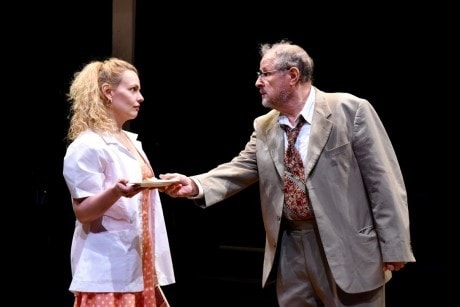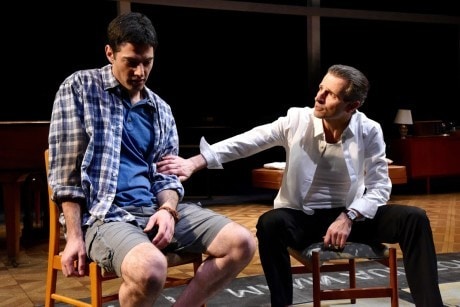“A prophet is not without honor except in his own country, among his own relatives, and in his own house,” said a certain prophet of Nazareth long ago. Subtract the word “prophet,” swap in “politically outspoken Israeli artist,” borrow storytelling structure from Ibsen (e.g. An Enemy of the People), and you have the gist of After the War, the new play by Motti Lerner just opened at Mosaic Theater Company.

There’s even a comically earnest doctor character who drops in Ibsenesquely: Bernard (a delightful Michael Toyaldo).
After the War is set in Tel Aviv in 2006 two weeks after the Second Lebanon War. Like Lerner’s prior and more provocative play The Admission, which played to great acclaim and ignited colossal controversy a season ago, After the War at its core of conscience casts a critical eye on the military conduct of Israel. But whereas the dramatic tension inThe Admission turned on disputed facts about a particular military action, what drives After the War is the conflict between a particular world-traveled and -renowned pianist and the family members who bitterly resent him for his widely publicized critical views about the country that was his home and is still theirs.
Lerner’s estimably highminded purpose in After the War is just as plain as it was in The Admission, but it doesn’t catch hold as well; it stays worn on the sleeve not felt from the heart. For After the War to work onstage with the sort of emotional power The Admission had, we have to be more than curious about its interestingly idiosyncratic assortment characters; we have to care about them—and that doesn’t happen, despite perfectly good performances from very well-cast actors ably directed by Sinai Peter.
I heard the script read during Kennedy Center’s Page-to-Stage Festival last fall and left thinking it felt formulaic, its character conflicts more forced than simmering up and erupting from within. The Mosaic production brilliantly opens up what is basically a one-set living room drama and gives it sweeping social context (in the form of projected warplanes) and resonant musicality (evoked by Frida Showham’s imposing orchestra hall set). Especially noteworthy is Eric Shimelonis’ outstanding sound design, which deceived me into believing I was hearing live orchestral and piano music in a concert hall. The play establishes its main character, Joel (Paul Morella), as a musical genius deservedly much lauded in the 18 years he has been abroad, and everything about the stagecraft makes that fact of the character credible and clear.
As written, Joel is seemingly sincere in his compassion for the Lebanese children whom Israeli militarism has turned into collateral victims—a compassion that, he says, has led him to take his public political stands. He believes “the person is also his conscience,” and he remembers that his piano-teacher mother Bella (Barbara Rappaport) taught him “not to separate the personal from the pianist,” so “I played to save us from our enemies and I played to save us from ourselves.” But as he confronts his own family with “what our soldiers did in your name in this war,” he seems not to have foreseen the extent to which his views would rankle them. Only now on this visit does he realize those views are anathema to his mother, his brother Freddie (James Whalen), and his 23-year-old son Izzy (Guy Kapulnik). And only now does he learn those views were so detested by his deceased father that the distress may have killed him. We are given to understand that Paul the great pianist has surmised none of this before because the 18 years he has been away have kept him busy touring and performing and so, by inattention or intention, he has been out of touch. Still, the character’s cluelessness about the resentment he will confront on this visit is odd indeed—it comes off as a private deficit of anticipatory empathy that sticks out in glaring contrast to the compassion he publicly espouses.

What emerges is a portrait of the great artist as egotist—as someone who in his personal life doesn’t really walk the noble talk of his public life. Paul never really gets where his family’s resentment might be coming from; he never really seems to seek the kind of empathic connection with any of them that might move the dial on their separate and aggregate animosity. His obliviousness to them while he gallivanted the globe does not seem that much displaced by authentic dialogue in the moment. Moreover he is all too ready for a dalliance with Trudy (Tonya Beckman), who is not only his mother’s nurse and Bernard’s ex-wife but maybe his brother’s betrothed.
The self-absorption problem with After the War’s main character as written does not function simply as the sort of “flaw” that makes a character more complex or interesting. It functions instead as a deal-breaker for our ability to empathize with the character and consequently our ability to relate emotionally to the play and therefore our inclination to feel the import of its message.
For make no mistake: The meaning of After the War is profoundly important. Its clear-eyed depiction of the brave and courageous artist who speaks out despite the professional and personal price to be paid is not only exemplary; it is a stance of ethical principle that is urgently needed. Though this particular script misfires, the Mosaic Theater Company that produced it—the thriving enterprise that Ari Roth conceived and helms, that Serge Seiden and Jennifer L Nelson co-create—precisely embodies the portrait this play aspires to: the essential socially conscious artist for whom art and politics not only mix but mesh.
“The purpose of art is to make people better,” said Lerner during the opening night reception. And he said of After the War that “the play wants to disturb you to ask what to do to not let this happen.” Lerner’s and his play’s intention is to be celebrated. And Mosaic is to be commended for bringing it to the stage.
Running Time: One hour and 45 minutes, without an intermission.
After the War plays through April 17, 2016 at Mosaic Theater Company of DC performing at Atlas Performing Arts Center – 1333 H Street NE, in Washington, DC. For tickets, call the box office at (202) 399-7993 ext. 2, or purchase them online.
LINK:
Robert Michael Oliver reviews After the War.





